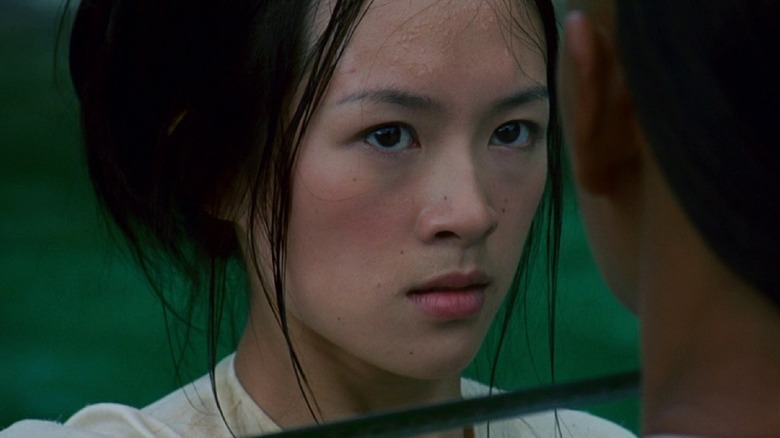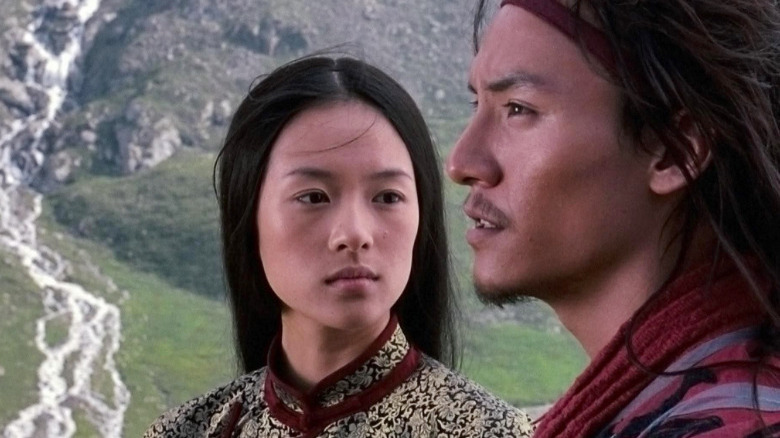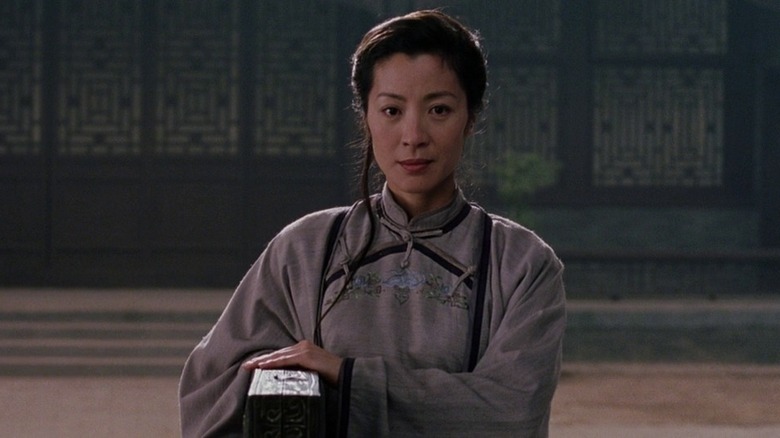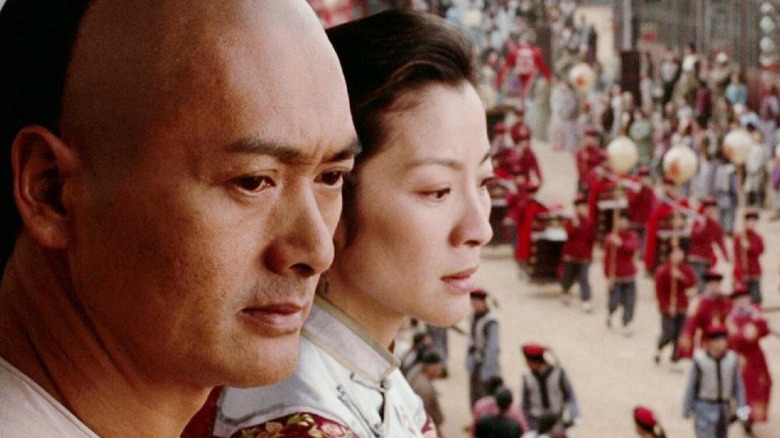Filming Crouching Tiger, Hidden Dragon Was A Constant Struggle Behind The Scenes
For as much as Ang Lee's directorial efforts differ wildly from one another, you can sort the majority of them into two broad categories. There are his romantic films like "Eat Drink Man Woman," "Sense and Sensibility," and "Brokeback Mountain," where factors like class and prejudice conspire to keep the movies' lovers apart. Then there are the bravado technical exercises such as "Hulk," "Life of Pi," and "Gemini Man," which experiment with how to tell a story through cinema by employing cutting-edge tech or even playing with the medium's very form.
Sitting at the nexus of those two groups is "Crouching Tiger, Hidden Dragon," Lee's wuxia classic based on the fourth work of Wang Dulu's Crane Iron pentalogy. It's a visually-staggering, sweeping historical martial arts epic where warriors effortlessly soar over city rooftops, clash swords above a wind-strewn bamboo forest, and pursue each other for days on end across a desert. "Crouching Tiger" is also a poignant tale in the vein of "Brokeback Mountain," examining the way societies wreak havoc on people's lives by forcing them to repress their feelings and true sense of self.
Of the many lessons one could take from Lee's eclectic career thus far (one that's naturally seen its share of ups and downs because of his ambition, not in spite of it), perhaps the most important is that there's no formula for making great art. In the case of "Crouching Tiger," the result is one of the finest films Lee has ever done, which is saying a lot. But at the same time, the movie was kind of a pain in the butt to make and it had exhausted its cast and crew (Lee included) by the time it was done shooting.
Bad weather and injuries
TIME recounted the many issues "Crouching Tiger, Hidden Dragon" ran into behind-the-scenes during production in an article published in December 2000 (the same month the film began its U.S. theatrical release). Its troubles included filming in the Gobi Desert, where Lee shot the extended flashback recounting how Jen Yu (Zhang Ziyi), the daughter of a powerful governor, met and fell in love with the bandit Lo Xiao Hou, aka Dark Cloud (Chang Chen). "We started shooting in the Gobi Desert," said Lee. "That night the crew got lost in the desert until 7 a.m. We finally got going, and after the second shot, a sandstorm came in." Producer Bill Kong added:
"The Gobi is the hottest, dryest place on earth. So each morning we lit incense for good luck. Well, we had dreadful luck — it rained sheets, nonstop, ruining our schedule. After a while one of the local people came around and said the gods must be smiling on us. We asked why. 'Because you burned the incense,' he said. 'We burn the incense when we want it to rain.'"
Then there were the incredible fight scenes, which boasted astonishing choreography by Yuen Wo-ping (who was fresh off his work on "The Matrix" at the time) and called upon Zhang, Chang, and their co-stars Chow Yun-fat (Li Mu Bai) and Michelle Yeoh (Yu Shu Lien) to perform a good deal of the wire-assisted stunt work themselves. That was hard enough on its own, even before Yeoh injured her knee and needed a month of rehab to recover. This also added to the pressure on Zhang. She had only made one other theatrical movie ("The Road Home") prior to starring in "Crouching Tiger" and said she "felt I was a mouse, and Ang Lee a lion." Lee, for his part, spoke very highly of Zhang and her work on the film:
"She allows the audience to pour themselves into her imagination. It's not really her in the movie, it's you. That's beyond acting. It's cinematic charisma."
'I thought I was about to have a stroke'
"Crouching Tiger, Hidden Dragon" also had to deal with a very different issue due to its casting. Although Lee wanted the movie's main cast to speak with native Mandarin accents, Chow (who's from Hong Kong) is a native Cantonese speaker, while Yeoh (who's from Malaysia) grew up speaking English and Malay. Chang, who's from Taiwan, did speak Mandarin but in a Taiwanese accent, meaning Zhang (who's from Beijing) was the only actor with a native Mandarin accent. Chow said he had an "awful" experience trying to deliver his lines the way Lee wanted, stating, "The first day I had to do 28 takes just because of the language. That's never happened before in my life." Yeoh admitted she had an equally hard time satisfying Lee with her line delivery but had nothing bad to say about the director:
"[I'd] been waiting 15 years to work with this guy. He's gentle and very emotional. During a sad scene at the end of the film, he kept telling me to do different things, and when he'd come over I'd see he was red-eyed, teary. He gets so completely involved. And when he says, 'Good take' after a shot, he really means it."
By the time all was said and done, Lee estimated that production on "Crouching Tiger" had taken eight months. "We shot around the clock with two teams," he noted. "I didn't take one break in eight months, not even for half a day. I was miserable — I just didn't have the extra energy to be happy. Near the end, I could hardly breathe. I thought I was about to have a stroke."
It all paid off in the end
In this case, however, Lee was rewarded for all his stress and effort. "Crouching Tiger, Hidden Dragon" was a box office hit that earned all-but universal praise from critics, with Roger Ebert going so far as to call it "the most exhilarating martial arts movie I have seen" in his rave review. It would go on to win four of the ten Oscars it was nominated for, including the prize for Best International Feature Film (back when it was called Best Foreign Language Film). The film also kicked Zhang's acting career fully into gear, paving the way for her to work with similarly revered filmmakers like Zhang Yimou and Wong Kar-Wai in the years that came after.
Once again, though, it just goes to show there is no secret formula to making great art, as nice as it would be if there were. You can invest a whole lot of time and money into crafting an ambitious genre movie like "Gemini Man" and still end up with a mediocre action film that bombs at the box office. You can also invest a lot of time, money, and effort into an equally ambitious movie like "Crouching Tiger" or "Life of Pi" and wind up with a critical darling that wins multiple Oscars while hitting it big at the box office. So goes the life of a filmmaker, just like anyone else in any other creative field.



